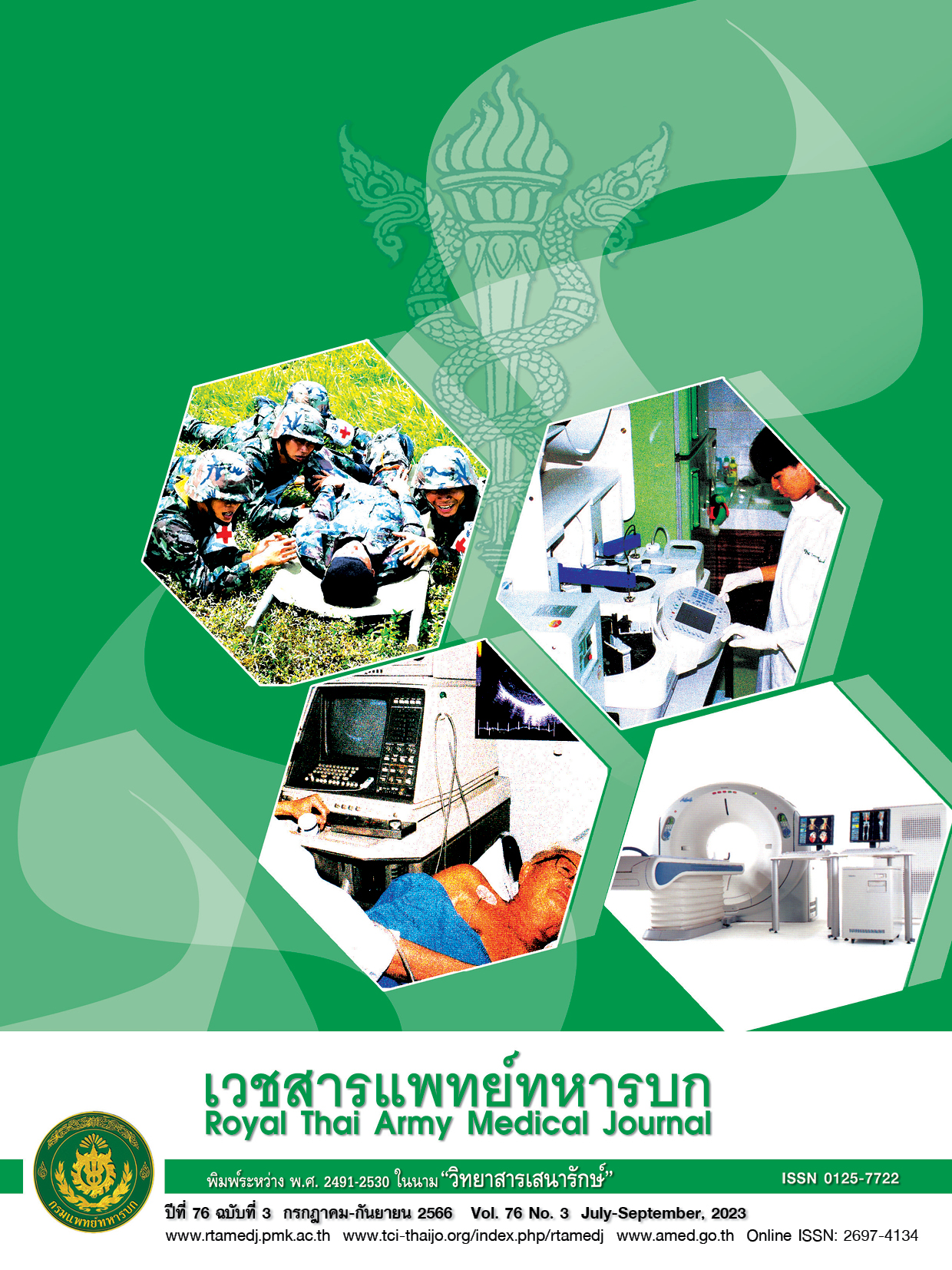ผลกระทบของภาวะไตวายต่อการทำนายผลของการผ่าตัดหลอดเลือดหัวใจ
Main Article Content
บทคัดย่อ
บทนำ ภาวะไตวายโดยเฉพาะในผู้ป่วยที่ต้องได้รับการฟอกไต (dialysis) ได้มีการกล่าวถึงว่ามีผลต่ออัตราการเสียชีวิตภายหลังการผ่าตัดหลอดเลือดหัวใจ วัตถุประสงค์ เพื่อศึกษาผลของการทำงานของไตก่อนการผ่าตัดกับภาวะแทรกซ้อนและเสียชีวิตภายหลังการผ่าตัดหลอดเลือดหัวใจ วัสดุและวิธีการ เก็บข้อมูลย้อนหลัง ตั้งแต่ปี พ.ศ. 2555 ถึง 2560 ในผู้ป่วยที่ได้รับการผ่าตัดหลอดเลือดหัวใจที่มีภาวะไตวาย ผลการศึกษา ผู้ป่วยทั้งหมด 764 รายแบ่งภาวะไตวายเป็น 4 ระดับได้แก่ 82 รายยังมีค่า CKD ปกติ, 245 ราย (ร้อยละ 32.07) เป็น mild CKD, 268 ราย (ร้อยละ 35.08) เป็น moderate CKD, และ 169 ราย (ร้อยละ 22.12) เป็น severe CKD พบว่ากลุ่ม normal CKD มี cardiopulmonary bypass time เฉลี่ย 125.06 ± 62.18 นาทีและเวลา cross-clamping time เฉลี่ย 89.82 ± 45.19 นาที อัตราการเสียชีวิตในโรงพยาบาลที่ 3 ราย (ร้อยละ 3.7) กลุ่ม mild CKD มี cardiopulmonary bypass time ที่ 115.44 ± 48.19 นาทีและ cross-clamping time ที่ 85.54 ± 40.69 นาที อัตราการเสียชีวิตในโรงพยาบาลที่ 7 ราย (ร้อยละ 2.9) กลุ่ม moderate CKD มี cardiopulmonary bypass time ที่ 111.88 ± 47.21 นาทีและ cross-clamping time ที่ 82.75 ± 37.79 นาที อัตราการเสียชีวิตในโรงพยาบาลที่ 18 ราย (ร้อยละ 6.7) กลุ่ม severe CKD มี cardiopulmonary bypass time และ cross-clamping time ที่ 126.69 ± 58.38 นาทีและ 89.74 ± 41.19 นาทีตามลำดับและมีอัตราการเสียชีวิตในโรงพยาบาลที่ 25 ราย (ร้อยละ14.8) สรุป พบว่าปัจจัยในการทำนายอัตราการเสียชีวิตในผู้ป่วยที่ภาวะไตวายได้แก่ โรคไตระดับรุนแรง การผ่าตัดแบบเร่งด่วน อายุมากและค่าบีบตัวของหัวใจต่ำ
Coronary artery bypass grafting, Mortality
Downloads
Article Details

อนุญาตภายใต้เงื่อนไข Creative Commons Attribution-NonCommercial-NoDerivatives 4.0 International License.
บทความในวารสารนี้อยู่ภายใต้ลิขสิทธิ์ของ กรมแพทย์ทหารบก และเผยแพร่ภายใต้สัญญาอนุญาต Creative Commons Attribution-NonCommercial-NoDerivatives 4.0 International (CC BY-NC-ND 4.0)
ท่านสามารถอ่านและใช้งานเพื่อวัตถุประสงค์ทางการศึกษา และทางวิชาการ เช่น การสอน การวิจัย หรือการอ้างอิง โดยต้องให้เครดิตอย่างเหมาะสมแก่ผู้เขียนและวารสาร
ห้ามใช้หรือแก้ไขบทความโดยไม่ได้รับอนุญาต
ข้อความที่ปรากฏในบทความเป็นความคิดเห็นของผู้เขียนเท่านั้น
ผู้เขียนเป็นผู้รับผิดชอบต่อเนื้อหาและความถูกต้องของบทความของตนอย่างเต็มที่
การนำบทความไปเผยแพร่ซ้ำในรูปแบบสาธารณะอื่นใด ต้องได้รับอนุญาตจากวารสาร
เอกสารอ้างอิง
Vejakama P, Ingsathit A, Attia J, Thakkinstian A. Epidemiological Study of Chronic Kidney Disease Progression: A large-Scale PopulationBased Cohort Study. Bangkok : National Research Council of Thailand.;2015. p.1-45.
Nwiloh JO, Obialo CI. Heart surgery in end-stage renal disease: is outcome worse for african american patients? Open J Cardiovasc Surg. 2013;6:21-6.
Minakata K, Bando K, Tanaka S, Takanashi S, Konishi H, Miyamoto Y, et al. Preoperative chronic kidney disease as a strong predictor of postoperative infection and mortality after coronary artery bypass grafting. Circ J. 2014;78(9):2225-31.
Go AS, Chertow GM, Fan D, McCulloch CE, Hsu CY. Chronic kidney disease and the risks of death, cardiovascular events, and hospitalization. N Engl J Med. 2004;351(13):1296-305.
Domoto S, Tagusari O, Nakamura Y, Takai H, Seike Y, Ito Y, et al. Preoperative estimated glomerular filtration rate as a significant predictor of long-term outcomes after coronary artery bypass grafting in Japanese patients. Gen Thorac Cardiovasc Surg. 2014;62(2):95-102.
Rahmanian PB, Adams DH, Castillo JG, Vassalotti J, Filsoufi F. Early and late outcome of cardiac surgery in dialysis-dependent patients: single-center experience with 245 consecutive patients. J Thorac Cardiovasc Surg. 2008;135(4):915-22.
KDIGO AKI Work Group. KDIGO clinical practice guideline for acute kidney injury. Kidney Int Suppl. 2012;2(Suppl. 1):1-138.
Ohira S, Doi K, Numata S, Yamazaki S, Kawajiri H, Yaku H. Impact of Chronic Kidney Disease on Long-Term Outcome of Coronary Artery Bypass Grafting in Patients with Diabetes Mellitus. Circ J. 2016;80(1):110-7.


